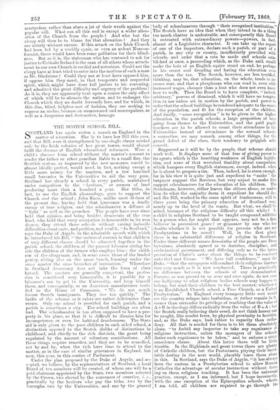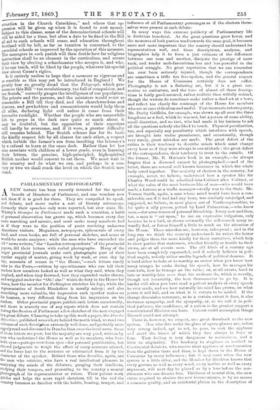THE SCOTCH SCHOOL BILL.
SCOTLAND has again stolen a march on England in the matter of education. She is to have her Bill this year, and that Bill, were it strengthened by one single clause needed only by the Irish colonies of her great towns, would almost fulfil the dreams of English educational reformers. Were a child's absence from school without the master's consent to render the father or other guardian liable to a small fine, the Scottish system. as improved by the new measures, would be almost ideally perfect, would need, in fact, nothing except a little more money for the masters, and a few hundred small bursaries in the Universities to aid the very poor. Scotland has already a school in every parish, maintained under compulsion by the " heritors," or owners of land producing more than a hundred a year. Her tithe, in fact, to use the English phraseology, goes to support the Church and the school ; John Knox, unlike most divines of the present day, having held that ignorance was a deadly enemy of true religion, and the schoolmaster a diffuser of
light" as well as the preacher. The people have ever since held that opinion, and being besides democrats of the true kind, who hold that every occupation is honourable in its own degree, they attend these schools without raising imbecile difficulties about caste, and position, and wealth. "In Scotland," says the Duke of Argyle, in the admirable speech with which he introduced his Bill, " the universal custom is that children of very different classes should be educated together in the parish school, the children of the poorest labourer sitting beside the children of the farmer who employs him ; the children of the clergyman, and, in some cases, those of the landed gentry, sitting also on the same bench, learning under the same master the same branches of instruction." Wherefore in Scotland democracy does not take the form of class hatred. The masters are generally competent, the profession is considered very honourable, it is possible for a labourer's son to get to the University, and keep himself there, and consequently. as an American manufacturer testified to the House of Commons, " We do not much favour Scotch immigrants. They rise too quickly." The faults of the scheme as it exists are rather deficiencies than errors. Only one school is provided for each parish, and a parish is sometimes a city. The school buildings are often bad. The schoolmaster is too often supposed to have a property in his place, so that it is difficult to dismiss him for incompetence, or even for habitual drunkenness. The State aid is only given to the poor children in each aided school, a distinction opposed to the Scotch dislike of distinctions in childhood, and chiefly to the rich districts, the grant being regulated by the amount of voluntary contributions. All these things require remedies, and they are to be remedied, not by and by, when the rich have time to attend to the matter, as in the case of similar grievances in England, but now, this year, in this session of Parliament.
Under the plan proposed by the Duke of Argyle, and accepted, we believe, by the representatives of Scotland, a local Board of ten members will be created, of whom one will be a paid chairman appointed by the State, two members selected by the Crown, two elected by the conveners of counties, i. e., practically by the heritors who pay the tithe, two by the boroughs, two by the Universities, and one by the general body of schoolmasters through " their recognized institution." The Scotch have an idea that when they intend to do a thing too much chatter is undesirable, and consequently this Board is entrusted with extraordinary powers—powers, in fast, almost of a Legislative character. It can take up the report of one of the inspectors, declare such a parish, or part of a parish, in any city or county, insufficiently provided with schools, and order that a rate be made and schools established at once, a proceeding which, as the Duke said, would make the hair of an English squire stand on end, he perhaps in his secret soul dreading and hating the education even more than the tax. The Scotch, however, are less terrified, thinking, may be, that education, on the whole, tends to in. crease rent, and that a ploughman who can read is, even with increased wages, cheaper than a lout who does not even know how to walk. Then the Board is to have complete, " indeed, arbitrary," powers of dismissal, which it will have no temptation to use unless set in motion by the parish, and power to order that the school buildings be rendered adequate to the wants of the population, and fit for the reception of the children. And finally, " some recognition " is to be given to the higher education in the parish schools, a large proportion of boys going from thence to the Universities, and the paid pupil. teachers are to be allowed to count their attendance in the Universities instead of attendance in the normal schools, a corrective, we may remark, among other things, for the grand defect of the class, their tendency to priggish self. conceit.
Supported as it will be by the people, that scheme should work well. It displays none of that fear of giving power to its agents which is the besetting weakness of English legislation, and none of that wretched timidity about compulsion which hampers every English statesman, except, indeed, when he is about to propose a tax. Then, indeed, he is stern enough, for in his view it is quite just and expedient to " make " the taxpayer support the Services, but very unjust to make him support schoolmasters for the education of his children. The Scotchman, however, either leaves the citizen alone, or makes him do what the majority deem it expedient he should do; and the Bill, worked in the same spirit of fearlessness, will in three years bring the primary education of Scotland very nearly up to the level of its wants. But what, we shall be asked, becomes of the religious difficulty all this while ? Is a child in religious Scotland to be taught compound addition by a person who, for aught that appears, may not be a finn believer in prevenient grace ? or -grammar by one who has doubts whether it is not possible for persons who are not Presbyterians to be saved ? Well, in the first place. there is no substantial difference of religion in Scotland. Under three different names five-sixths of the people are Presbyterians, absolutely agreed as to doctrine, discipline, and ecclesiastical government, and differing only as to the interpretation of Christ's order about the things to be rendered unto God and Caesar. ‘. We have full confidence," says the Duke, " that the ratepayers will conduct their religious instruction very much as it is now conducted. There is practically no difference between the schools of any denomination. Parents, as was proved to us over and over again, do not care one halfpenny to what religious bodies schools may happen to belong, but send their children to the best master; whether it is an Established Church school, a Free Church, or a United Presbyterian." In England every trumpery little sect would see the country relapse into barbarism, or rather remain in it. sooner than surrender its privilege of teaching that the value of A+B in theology differs radically from the value of B+A ; but the Scotch really believing their creed, do not think heresy can be caught, like scarlet fever, by physical proximity to heretics, and, as the Duke says, look rather to capacity than orthodoxy. All that is needed for them is to let them absolutely alone, " to forbid any inspector to take any cognizance of religious instruction, unless the managers of the schools desire such cognizance to be taken," and to enforce a strict conscience clause. About this latter there will be little trouble. In the Highlands and great towns there are plenty of Catholic children, but the Protestants, pitying their inevitable destiny in the next world, placably leave them alone in this. In Scotland, says the Duke of Argyle, "it has always been the custom in a Presbyterian school to allow Rowe Catholics the advantage of secular instruction without forcing on them religious teaching. It has been the universal practice, except, as I am informed, but I hope incorrectly, with the one exception of the Episcopalian schools, where, I am told, all children are required to go through 111 struction in the Church Catechism," and where that oppression will be given up when it is found to cost money. Subject to this clause, some of the denominational schools will still be aided for a time, but after a date to be fixed in the Bill all aid to such schools will cease, and education throughout Scotland will be left, as far as taxation is concerned, to the parochial schools as improved by the operation of this measure. The managers in each parish will then decide how far religious instruction shall be an element in the curriculum, and secure their view by electing a schoolmaster who accepts it, and who, if he can teach, will be liked by the people, whatever his special view about Cmsar's rights.
Is it entirely useless to hope that a measure as vigorous and as sensible as this may yet be introduced in England f We greatly fear so, greatly dread that the Telegraph, which pronounces this Bill " too revolutionary, too full of compulsion, and too Scotch," correctly gauges the intelligence of our population. The priests and the parsons, and the ministers would resist so reasonable a Bill till they died, and the churchwardens and deacons, and pewholders and communicants would help them all alike, declaring light evil unless it came from their favourite rushlight. Whether the people who are meanwhile left to grope in the dark care quite so much about it may be doubtful, but the opposition of their superiors will hardly be overcome, and if it were, a greater difficulty still remains behind. The Scotch scheme has for its basis the kindly respect felt by all classes for each other, a respect which forbids the farmer's son from insulting the labourer's by a refusal to learn at the same desk. Rather than let her sons associate with children of a lower grade, even in learning their letters, the genuine, high-principled, high-spirited British mother would consent to eat them. We must wait in this country and do what we can, and perhaps in a century or two we shall reach the level on which the Scotch now stand.



































 Previous page
Previous page